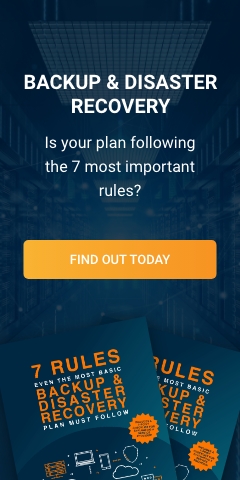Given the endless news about malware, phishing, and other cybercrime today, you might have also heard about the dangers of the dark web. But what exactly is the dark web? If you surmised that it's a hidden place on the internet where cybercriminals lurk, then you're partly correct.
Why should your business be afraid of the dark web?
Busting the biggest cybersecurity myths

Cybersecurity is a complex and constantly changing field. Just when security experts develop a cutting-edge security application, hackers have already found different ways to compromise business systems.
It also doesn’t help that there are several myths perpetuated about hackers and security practices.
Does your company have a cybersecurity strategy?

According to the Cyber Security Breaches Survey 2019, 32% of the companies that were surveyed experienced at least one data breach within the last 12 months. The study noted that hackers did not discriminate between a small- to medium-sized business (SMB) and a major enterprise; also, smaller organizations spent little on cybersecurity, most likely due to a lack of funds.
How should your company respond to a security breach?

Facebook was in trouble back in September 2018, when hackers took advantage of an exploit in one of their social media features. This led to over two billion user accounts being compromised, including personal information like usernames, gender, email addresses, location check-ins, and relationship statuses.
How to keep your computer spyware-free
Types of VoIP apps for internet calls

The quicker small- and medium-sized enterprises (SMEs) grow their business across local and international regions, the more they demand practical solutions that improve their collaboration and communication with remote employees. VoIP tools meet this demand because they are perfect for wireless telecommunication infrastructures: they support enterprise mobility and are cost-effective.
How to future-proof your company’s IT security

Newer and more complex cyberthreats like ransomware (malware that is programmed to deny access to a computer until a ransom is paid) and illegal cryptocurrency mining (using someone’s computing power without their knowledge, putting additional strain on the hardware) will require your business to update its cybersecurity system often.
How can your company migrate from Windows 7?

Is your enterprise still running its business applications on Windows 7? You only have a few months to go before January 14, 2020, when Microsoft will no longer support the operating system (OS).
While your company can still use Windows 7 past its end-of-support (EOS) date, the risks of encountering a data breach are higher, and your business will be noncompliant with industry standards like HIPAA since the developers will stop issuing software updates for it.
Prepare your business for Windows Server 2008 end of support

A decade ago, Microsoft released Windows Server 2008 to the public. This server operating system (OS) was known for innovative features like data compression and compatibility with many third-party applications. But nothing lasts forever, as Windows Server 2008 will reach the end of its product life cycle by January 14, 2020. While enterprises may continue using the platform, doing so will expose them to major security risks, since Microsoft will no longer issue software updates or add new features to it.
The benefits of upgrading to Windows 10 now

Despite the fact that Windows 7's end-of-life support is approaching fast, some small- to medium-sized businesses (SMBs) may have a hard time upgrading to Windows 10. The good news is that Microsoft will continue providing premium features and security updates for Windows 7 until 2023 but only for Professional and Enterprise users.



